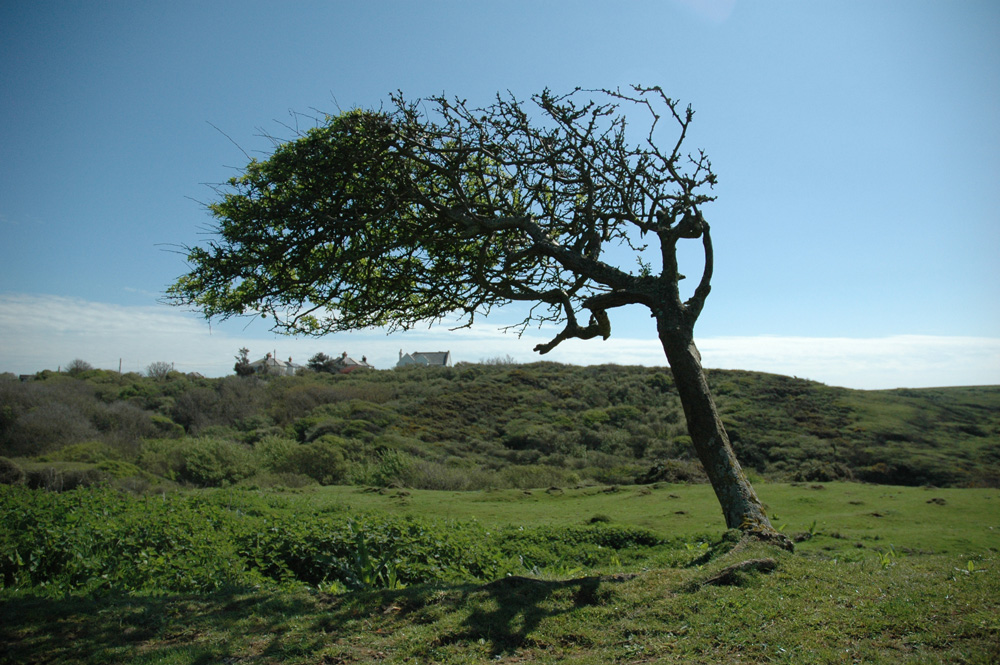Selecting the right trees for windy Kansas City landscapes requires careful consideration of both species selection and placement. The Johnson County K-State Research and Extension recommends several proven performers that combine wind resistance with beauty and adaptability to our local climate.
Native species often provide the best wind resistance, having evolved to handle our region’s conditions. The Missouri Department of Conservation particularly recommends these wind-resistant native trees for our area:
Bur Oak (Quercus macrocarpa) stands as a testament to durability, developing a deep root system and strong branching structure that withstands high winds. These majestic trees can live for centuries, providing shade, wildlife habitat, and outstanding wind resistance.
Hackberry (Celtis occidentalis) thrives in urban environments while maintaining excellent wind resistance. Its adaptable nature and strong wood make it an ideal choice for exposed sites. According to the Kansas Forest Service, Hackberry demonstrates remarkable resilience during storms.
Kentucky Coffeetree (Gymnocladus dioicus) offers a unique combination of wind resistance and urban tolerance. Its open branching pattern allows wind to pass through, reducing the risk of damage during storms. The City of Kansas City Parks and Recreation includes this species in their recommended street tree list.
Planting for Success
Proper planting techniques significantly impact a tree’s wind resistance. The Kansas City Native Plant Initiative suggests these essential steps:
Create a wide planting hole three times the width of the root ball but no deeper than the root ball itself. This encourages lateral root growth for better stability. Incorporate organic matter into the backfill soil to improve drainage and root development.
Stake newly planted trees only when necessary and remove stakes after one growing season to allow the trunk to develop strength. The Missouri Botanical Garden emphasizes that movement helps trees develop stronger trunks and roots.
Maintenance Matters
Regular maintenance helps ensure long-term wind resistance. Schedule annual inspections with certified arborists to identify and address potential weaknesses before storms strike. The Tree Care Industry Association recommends proper pruning to:
Maintain a strong central leader in young trees Remove crossing or rubbing branches Thin the crown to reduce wind resistance while maintaining the tree’s natural form
Design Considerations
When planning your landscape, consider wind patterns and exposure. Create windbreaks using multiple species at different heights. The Kansas State University Horticulture Department recommends grouping trees to provide mutual protection while maintaining adequate spacing for root development.
Remember that even the most wind-resistant trees need proper care during establishment. Deep watering encourages deep root growth, while mulching helps retain moisture and protect roots. Contact local nurseries specializing in native plants for the best selection of wind-resistant species suited to our climate.
By selecting appropriate species and following proper planting and maintenance practices, you can create a beautiful, wind-resistant landscape that thrives in Kansas City’s challenging conditions.
Frequently Asked Questions
Bur Oak, Eastern Red Cedar, and Hackberry are among the most wind-resistant native trees in Kansas. These species have evolved to withstand our local conditions.
In windy areas, plant trees at the same depth as the root ball, ensuring the root flare is visible above ground. Deep watering encourages deep root growth for better wind resistance.
Fall is ideal for planting in Kansas City, typically September through early November. This allows roots to establish before winter and spring winds arrive.
Plant large trees at least 20-30 feet from structures, medium trees 15-20 feet, and small trees 10-15 feet away. Consider mature size when planning placement.
Regular pruning to maintain a strong structure, deep watering to encourage deep roots, and annual inspections are essential for wind-resistant trees.
